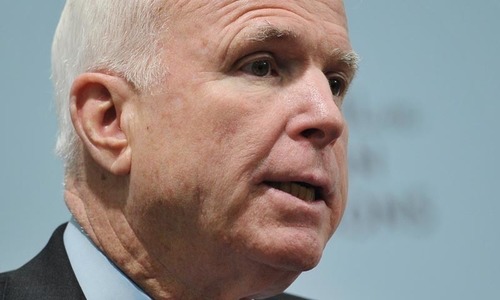WASHINGTON: Building trust between Pakistan and the US is important for promoting peace in Af-Pak region, says Ambassador Aizaz Chaudhary as the debate on the new US policy for Afghanistan and Pakistan intensifies.
But Daniel Markey of the Johns Hopkins School of Advanced International Studies argues that “Pakistan’s strategy of using proxies for protecting its interests in Afghanistan” prevents the proposed building of trust.
Bennett Seftel of the Cipher Brief, Washington, which hosted the debate on Thursday evening, pointed out that US-Pakistani relations had come to be defined by the enduring war in Afghanistan, the longest military engagement in US history.
“The US has spent significant blood, sweat, and tears working to bring stability to a country that has been mired in conflict for over 50 years, and many in the US feel that Pakistan has undermined US objectives in Afghanistan,” Mr Seftel added.
Because the Trump administration is expected to announce its new policy later this month, the debate on the future of the US war in Afghanistan and its impact on US-Pakistan relations has intensified. While most commentators blame Pakistan for US failures in Afghanistan and suggest a strong punitive action against Islamabad, some suggest a softer approach.
“The United States still has numerous equities with Pakistan, and can little afford to alienate Pakistani leaders precisely when it is considering reinvesting in an Afghan peace process,” said Joshua T. White, an associate professor of the Practice of South Asia Studies at the Johns Hopkins School of Advanced International Studies.
Mr White, who was the director for South Asian affairs at the White House National Security Council in the Obama administration, noted that New Delhi too was lobbying for a stern US action against India-focused groups like Lashkar-e-Taiba and Jaish-e-Mohammad.
While “New Delhi may continue to hear a tougher rhetorical line on Pakistan, but so far there are few indications that Trump would be willing to use America’s limited leverage with Pakistan to press for action against (those groups),… rather than groups like the Haqqani-Taliban network that directly target US forces in Afghanistan”.
Mr White argued that “Washington’s hands are tied with numerous political, diplomatic, and security limitations rearing their heads” and it would avoid taking a position that could “draw Islamabad and Beijing closer”.
Two recent articles in The New York Times highlighted two divergent views on how the US should approach Pakistan. One of them, by Stephen J. Hadley and Moeed Yusuf of the US Peace Institute, Washington, urged the Trump administration to talk to Pakistan if it wanted peace in Afghanistan.
The other, by Husain Haqqani, Islamabad’s former envoy in Washington, said: “To win Afghanistan, get tough on Pakistan.”
Mr Hadley, who was the National Security Adviser to President George W. Bush, and Mr Yusuf said that “slapping further conditions on assistance, imposing sanctions or listing Pakistan as a state sponsor of terrorism… are unlikely to change Pakistan’s behaviour”.
Pakistan’s “existential concerns are tied to broader regional priorities” and to get Pakistan to alter its approach in Afghanistan, “the United States must understand and address Pakistan’s strategic anxieties”, said the two scholars, pointing out that Islamabad has “always feared a scenario in which Afghanistan offers India a second base from which to squeeze Pakistan”.
Mr Haqqani, however, rejected Pakistan’s concerns about the Indian presence in Afghanistan as “imaginary fears” and urged Washington “not to let Pakistan link its longstanding support for hard-line Pashtun Islamists in Afghanistan to its disputes with India”.
He urged the Trump administration to impose “sanctions against individuals and institutions involved in facilitating Pakistan-based Taliban leaders” and to pursue “Taliban reconciliation talks without depending on Pakistan”.
Ambassador Chaudhary warned that such an approach would not work. He said that building trust between Pakistan and the US was the only viable way of promoting peace in the region.
He rejected as “totally absurd” the suggestion that Pakistan’s Inter-Services Intelligence agency maintained close ties with Taliban and the Haqqani network.
Published in Dawn, July 8th, 2017













































